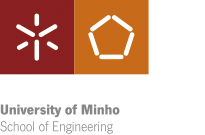Thursday, 3/29/2018
The IAPMEI – Agency for Competitiveness and
Innovation recently recognised 20 national competitiveness clusters. The
TICE.PT Cluster is the highlight of this edition and counts on the intervention
of the School of Engineering of the University of Minho (EEUM).
The cluster of
TICE.PT – Information, Communication and Electronic Technologies – was created
in 2008 with great expressiveness of the PT company in collaboration with the
University of Aveiro. The TICE.PT involves and mobilises relevant actors
throughout the country, particularly in the regions of Braga, Porto, Coimbra
and Lisbon, covering the entire value chain in the TICE area.
With
an aggregating role between the universities and business communities, this
cluster aims at building a collaborative platform that engages and mobilises
the main actors of TICE in the processes of innovation, R&TD,
knowledge transfer, advanced training, development, production and commercialisation
of products and services, marketing and internationalisation.
The former
PCT’s – Competitiveness and Technology Centres – designation assigned by previous
governments, gave place to the current clusters. The terminology is different,
but the essence remains: look at the territory - from the point of view of
economic activities - and add a set of consortiums capable of acting
strategically to develop economic activities with added value. “Clusters are
more than PCT’s. They have to demonstrate that their formalisation is relevant
to society, because they aggregate national entities of the scientific and
business system that contribute objectively to Portuguese GDP, namely in the
country’s export capacity”, Ricardo Machado, EEUM’s representative through the ALGORITMI
Research Centre (ALGORITMI), explained.
This cluster
has helped companies and other entities to form consortia and mobilising
projects – large-scale projects that carry out cross-cutting studies, from the
point of view of regional and institutional interests, focus on a variety of
issues. These projects are transversal to society, as they engage many
companies and universities, and are driven by the clusters’ activity, in
particular the TICE.
On the aggregation
of competencies in multisectoral clusters, Ricardo Machado reinforces that this
junction of entities contributes to a collective efficiency and that clusters “allow
to put actors of the same domain in dialogue, to make possible the cooperation
among themselves”. “This promotes not only the capacity building of the
industry, but also the opportunity to form partners with a dimension and scale
capable of competing at the international level”, the researcher concludes.
The cluster of
TICE.PT aims at making Portugal a world reference in the sector until 2020,
betting on technological leadership, responses to societies’ challenges and on
the training of companies and people, with repercussions on the sustainability
of the national economy. This aggregation gathers 89 entities from the most
different areas of the national academic and business fabric.
In February
2017, within the presentation of the Interface Programme, the TICE.PT Cluster
was recognised by the Portuguese Government as a Competitiveness Clusters,
along with other 19 national Clusters.
+
info: https://www.iapmei.pt/; https://www.tice.pt/pt-pt

